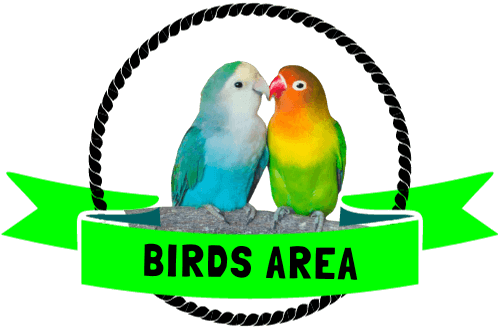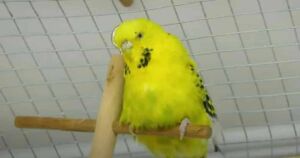Why Do Budgies Fall Off Their Perch?
Budgies, or parakeets, bring joy with their vibrant plumage and playful demeanor. Owners may worry when these delightful birds fall off their perch, signaling potential health concerns. Unraveling the reasons behind why do budgies fall off their perch is vital for proper care and addressing any underlying issues promptly.
Budgies may fall off their perch due to illness, imbalance, or lack of grip strength. Budgies are playful and active birds known for their acrobatic movements and playful nature.
However, I explore the potential reasons behind this behavior today, providing valuable insights to help budgie owners better understand and support their feathered friends.
Let’s dive into the world of budgie behavior and health to shed light on this intriguing phenomenon.
Why Do Budgies Fall Off Their Perch? Uncover Possible Reasons
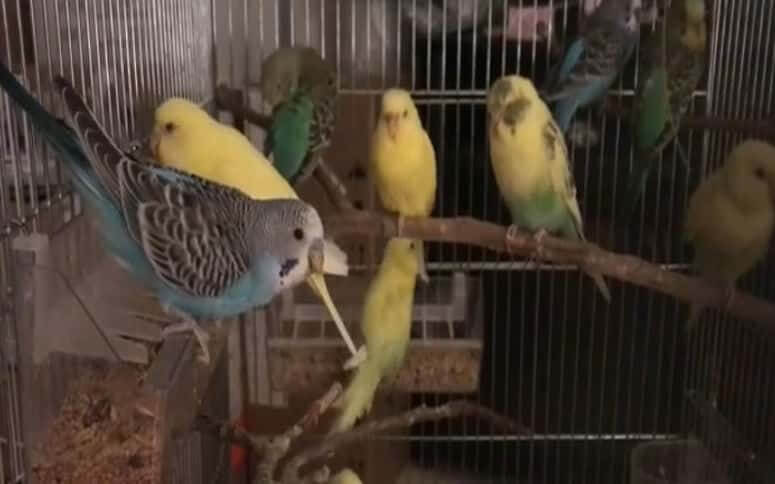
Budgies, or budgerigars, may fall off their perch for various reasons. While occasional falls are normal and may not cause concern, frequent or prolonged falls could indicate an underlying issue.
Here are some common reasons why budgies might fall off their perch:
Sleeping Position
Budgies often sleep on one leg, and sometimes, they can lose balance and fall off their perch while adjusting their sleeping position. However, this is generally not a cause for concern unless it happens frequently.
Illness or Injury
Sick or injured budgies may have weakened muscles or coordination issues, making them more prone to falling.
If your budgie repeatedly falls off the perch and displays other signs of illness or injury, seeking veterinary attention is essential.
Old Age
Older budgies may experience a decline in muscle strength and coordination, leading to balance issues and falls. Providing a lower perch or placing soft padding at the bottom of the cage can help prevent injuries.
Environmental Factors
Changes in the environment, such as a new cage setup or rearrangement of perches, can temporarily confuse budgies, causing them to lose balance. Give your budgie some time to adjust to changes.
Lack of Grip
It may struggle to maintain balance if the perch is too slippery or the budgie’s feet are not gripping properly. Providing a variety of perch sizes and textures can help improve grip.
Wing Clipping
Budgies with clipped wings may have difficulty maintaining balance, especially if they try to fly or jump. If your budgie’s wings are clipped, ensure that perches are easily accessible and at a suitable height.
Dizziness or Disorientation
Inner ear problems or infections can affect a budgie’s sense of balance, leading to falls. If you suspect an ear issue, consult with a veterinarian for a proper diagnosis.
Territorial Behavior
In multi-budgie households, conflicts over perch space can result in one budgie being pushed off by another.
Nutritional Deficiencies
Poor nutrition can lead to weakness and coordination problems. Ensure your budgie is receiving a balanced diet with appropriate vitamins and minerals.
Parasites or Infections
Internal parasites or infections can affect a budgie’s overall health, including its ability to maintain balance. Regular veterinary check-ups can help detect and address health issues.
If your budgie is consistently falling off its perch or displaying other concerning symptoms, it’s crucial to consult with an avian veterinarian.
A professional can assess the bird’s overall health and guide potential causes and appropriate treatments.
Regular veterinary care, a balanced diet, and a stimulating environment can contribute to the well-being of your budgie.
Can Budgies Sleep On A Perch?

Yes, budgies can sleep on a perch due to a unique physiological adaptation. Their feet are structured in a way that allows them to grip onto a perch even when they are asleep securely.
However, this ability stems from their wild instincts, where sleeping and perching safely are vital for survival.
Budgies have a fascinating ability to keep one part of their brain alert while the other part sleeps, which enables them to sense danger and respond swiftly if needed.
However, this ensures they remain relatively safe even while sleeping on a perch.
Do Budgies Fall Off Their Perch While Sleeping?
Budgies, or budgerigars, are known for their ability to sleep while perched on a roosting branch or perch. Their feet have a locking mechanism that helps them grip the perch, even when asleep.
The tendons in their legs and feet allow them to lock their toes around the perch, providing a secure hold.
Also, it’s relatively rare for budgies to fall off their perches while sleeping, especially if they are healthy and the cage environment is suitable. However, there can be exceptions.
Factors such as illness, age, or an unstable perch may increase the likelihood of a budgie falling while sleeping.
To minimize the risk of falls, ensure the cage is appropriately sized, clean, and well-maintained. Provide perches of various sizes and textures to encourage foot exercise and prevent foot problems.
Overall, budgies are well-adapted to sleeping on perches, and falling during sleep is not common under normal circumstances.
However, you can watch the video for more knowing about Why don’t budgies birds fall off while sleeping.
What Are The Consequences Of Falling Off The Perch?
Falling off the perch” is a colloquial expression that refers to dying or passing away. The phrase is often used humorously or light-heartedly to soften the impact of discussing death.
The consequences of falling off the perch are essentially the consequences of death, and they can have various implications:
- Injuries: Falls can result in injuries to the bird, such as broken wings or legs.
- Stress: The experience of falling can cause stress and anxiety for the budgie.
- Fear of Height: A fall can instill fear of perching at heights, leading to reluctance to perch again.
- Disorientation: Falling off the perch can lead to disorientation and a temporary loss of balance.
- Impact on Confidence: Repeated falls may impact the budgie’s confidence and ability to trust its surroundings.
However, it’s important to note that the consequences can vary widely based on individual circumstances, cultural factors, and the relationships involved.
Differentiating Between Accident And Play Budgie Falling Off Its Perch
If your budgie falls off its perch occasionally and quickly regains balance, it is likely a part of its playful nature. Playful budgies often jump, climb, and fly around their cages, sometimes pushing themselves to the balance limit.
| Criteria | Playful Behavior | Accident |
|---|---|---|
| Behavior | Intentional, often repeated falls with playful demeanor | Sudden, unexpected falls with signs of distress |
| Body Language | Relaxed, animated, curious | Distressed, rapid breathing, widened eyes, fluffed feathers |
| Vocalization | Happy chirping or singing | Silence or distress calls after the fall |
| Repetition | Repeated without signs of distress | Infrequent falls or followed by stress |
| Environmental Factors | Interaction with toys or environment during the fall | Falls during routine activities on the perch |
What Should I Do If My Budgie Keeps Falling Off Its Perch?
If your budgie keeps falling off its perch, assessing the situation promptly is essential. Start by examining the perch’s stability and size, ensuring it’s appropriate for your budgie’s feet.
Check for any signs of injury or discomfort in your bird’s feet or legs. If the perch seems unstable or too small, replace it with a more secure or adequately sized perch.
Observe your budgie’s behavior for any signs of illness, imbalance, or weakness. Changes in behavior, such as reduced activity or balance issues, may indicate a health concern requiring a vet’s attention.
Consult an avian veterinarian if the falling persists or if you notice any other symptoms.
A professional can examine your budgie, rule out any health issues, and provide guidance on perch selection, cage setup, or potential health interventions to ensure your budgie’s well-being.
Regular vet check-ups are also crucial for maintaining your bird’s health.
What Types Of Perches Are Bad For Budgies?

Budgies, or budgerigars, are small parakeets that need appropriate perches in their cages for both comfort and health.
While perches are essential for budgies to exercise their feet and maintain overall well-being, certain types of perches can be harmful.
Here are some types of perches that are generally considered bad for budgies:
| Type of Perch | Why It’s Bad for Budgies |
|---|---|
| Sandpaper Perches | Can cause irritation and abrasions to the sensitive foot pads. |
| Concrete Perches | May lead to foot problems and discomfort over time. |
| Dowel Rod Perches | Lacks variety in diameter, potentially causing foot issues. |
| Slippery or Slick | Difficult for budgies to grip, leading to insecurity and stress. |
| Uneven or Wobbly | Increases the risk of injury, especially during landing/takeoff. |
| Too Thick or Too Thin | Uncomfortable for the bird’s feet and can cause health issues. |
However, it’s important to note that providing a variety of perch types with different diameters and textures is ideal for promoting foot health and preventing boredom in budgies.
Always monitor your budgie’s behavior and adjust perches accordingly to ensure their well-being.
How To Create a Safe Perch Environment For Budgie?
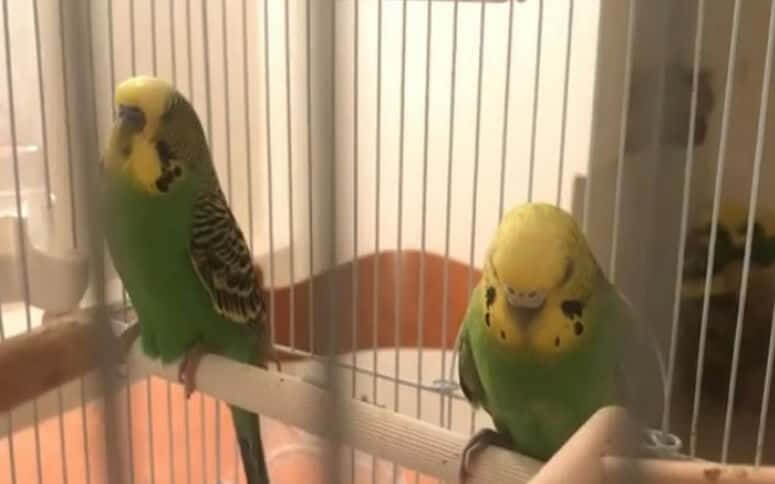
Creating a safe perch environment for your budgie is crucial for its well-being.
Here are some tips to help you set up a safe and comfortable perch environment for your budgie:
Selecting The Right Perch Material And Size
Choosing perch material and size can significantly impact your budgie’s comfort and safety. Here are vital considerations to keep in mind:
- Material: Opt for natural wood or safe plastic perches. Natural wood perches provide a more comfortable and stimulating grip for your budgie, mimicking the branches they would encounter in their natural habitat. Ensure the wood used is free from chemicals, pesticides, and toxic substances.
- Size: Perches should be selected based on your budgie’s foot size. Ideally, the perch should be of a diameter that allows your budgie to grip around it easily. It is suggested that the perch should be between 1/2 inch to 3/4 inch in diameter.
- Variety: Offering a variety of perch materials and sizes will give your budgie options for exercise and foot health. Consider including different types of perches, such as a rope perch or a natural branch, for added variation.
Placement Of Perches In The Cage
Strategically placing perches within the cage can not only prevent falls but also promote a more stimulating environment for your budgie. Here are some guidelines for proper perch placement:
- Spacing: Space perches throughout the cage, ensuring they are not too close together. However, this allows your budgie to move easily between different perches, exercising their wings and keeping them active.
- Height: Consider placing perches at varying heights within the cage. This mimics the branches they would encounter in the wild and provides different perching spots for your budgie to choose from, promoting a sense of security and exploration.
- Proximity to food and water: Position a perch near your budgie’s food and water dishes to facilitate convenient access to their daily nutritional needs.
Minimizing Hazards Around The Perch Area
Creating a safe perch environment involves minimizing potential hazards that could lead to accidents or injury.
Here are some precautions to take:
- Cage Bar Gaps: Ensure the gap between the cage bars is narrow enough to prevent your budgie from slipping through and becoming trapped. Typically, the spacing between bars should be no more than 1/2 inch.
- Cage Placement: Place the cage away from drafts, windows, and direct sunlight. However, this will help prevent extreme temperatures that could make your budgie uncomfortable or unwell.
- Avoid Overcrowding: Ensure the cage is not overcrowded with toys or accessories that could obstruct the bird’s movements or cause them to lose their balance.
By carefully selecting the right perch material and size, placing perches strategically within the cage, and minimizing potential hazards, you can create a safe perch environment for your budgie.
However, this will reduce the risk of falls and provide them with a comfortable and stimulating space to thrive.
Can Training Improve A Budgie’s Perch Stability?
Training significantly enhances a budgie’s stability by introducing varied perch types, gradually acclimating the bird to different materials and diameters.
Through consistent training exercises and positive reinforcement, budgies learn to navigate perches, improving their balance and confidence easily.
Interactive play sessions and supervised exploration outside the cage bolster their stability skills. Patience and consistent, short sessions are crucial, allowing gradual progression and adapting to individual comfort levels.
Training fosters perch stability and strengthens the bond between bird and owner, creating a stimulating environment for the budgie’s physical and mental well-being.
How Do You Train A Bird To Stay On A Perch?
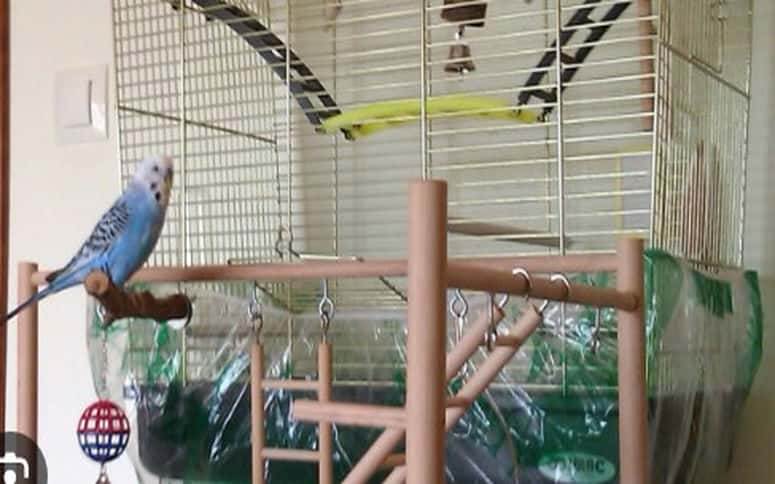
Training a bird to stay on a perch involves patience, positive reinforcement, and a gradual approach. Here’s a step-by-step guide:
Step 1: Select a Comfortable Perch
Choose a perch that is appropriate in size and material for your bird. Ensure it’s stable and easy for the bird to grip.
Step 2: Introduce the Perch
Start by introducing the perch inside or near the bird’s cage. Allow the bird to become familiar with it by observing and exploring.
Step 3: Encourage Perching
Gently encourage the bird to step onto the perch using a cue word or a target stick. You can use treats to lure the bird onto the perch.
Step 4: Short Perching Sessions
Initially, aim for short perching sessions to prevent the bird from feeling stressed or uncomfortable. Gradually increase the duration as the bird becomes more accustomed to staying on the perch.
Step 5: Use Positive Reinforcement
When the bird successfully stays on the perch, offer verbal praise, treats, or a favorite toy. Positive reinforcement reinforces the behavior and encourages the bird to repeat it.
Step 6: Repeat and Extend Sessions
Consistently repeat the training sessions, gradually increasing the time the bird spends on the perch. Be patient and allow the bird to progress at its own pace.
Step 7: Expand Perch Training
Once the bird is comfortable staying on one perch, introduce other perches, gradually expanding the training to different locations and perches of varying sizes and textures.
Consistency is key. Train regularly but keep the sessions short and positive. Avoid forcing the bird to stay on the perch if it appears stressed or uncomfortable.
As the bird becomes proficient, you can introduce commands or cues to signal when you want it to perch and stay.
Gradually practice perching outside the cage in a controlled environment, using positive reinforcement to encourage the bird to stay on the perch.
Remember, each bird is unique, and the training pace may vary. Always prioritize the bird’s comfort and well-being during training sessions, and if the bird shows signs of stress or discomfort, take a step back and proceed more slowly.
Tips To Prevent Budgie Falling Off From Perch

Bird owners know that budgies are prone to falling off their perch. However, it’s essential to understand why this happens and how to prevent it.
Below are some effective tips to help keep your budgie safe and secure on their perch.
- Proper Perch Placement: Place the perches at varying heights within the cage to encourage movement and exercise for your budgie.
- Choose the Right Perch: Use natural wooden perches of various widths to help prevent foot problems and promote foot health for your budgie.
- Regular Cage Cleaning: Keep the bird’s cage clean, removing any droppings and debris to prevent slipping on the perches.
- Check for Bar Spacing: Ensure the cage bars are not too wide apart that the budgie could accidentally slip through and fall.
- Lack of Overcrowding: Avoid overcrowding the cage with too many toys or perches, giving your budgie enough space to move around comfortably.
- Provide a Stable Environment: Place the cage in a calm and quiet area to reduce stress and minimize the chances of your budgie panicking and falling off the perch.
Preventing budgies from falling off their perch requires simple environmental adjustments and regular care.
By following these tips, you can help ensure that your budgie stays safe and secure while perched in its cage.
FAQ
Should I be concerned if my budgie falls occasionally?
What types of perches are best for budgies?
How can I address perch falls in older budgies?
Should I provide additional support for older budgies?
Are there specific signs to watch for indicating perch-related issues?
Sum Up
Understanding the reasons behind budgies falling off their perch can help you ensure the well-being of your feathered friend.
Whether it is due to health issues, balance problems, or simply a lack of grip, addressing the underlying cause is crucial for their safety.
You can help your budgie stay perched and happy by providing a comfortable and secure environment and regular check-ups.
Remember, their perch time is not only for relaxation but also for their overall physical and mental health. So, observe, care, and keep your budgie flying high!
